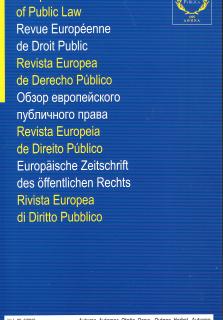
Administrative Law / Droit administratif
2008-2009
Austria / Autriche
Magdalena Pöschl
Univ-Prof. Dr. an der Universität Graz
After the general elections in September 2008, the current government lost its majority for constitutional amendments. The previously initiated state reforms were brought to a standstill. At the level of ordinary legislation, attempts were made to deal with the financial and economic crisis. Measures for the protection of the environment were mainly taken to comply with the European or international law obligations. A further goal is the complete deregulation of postal services. In traffic law, the prevention of accidents caused by speeding and driving under the influence of alcohol was brought into focus. In the field of public health law, the financial restructuring of the health insurance fund was the main topic. In the area of education, A-levels have been harmonised in order to comply with international standards. In the field of internal security, the cooperation between police authorities of the various EU Member States was regulated. Furthermore, asylum and immigration laws have become stricter and the humanitarian right of residence was reformed. As to European law, an investigation started by the European Commission concerning state funding of the public broadcasting company ORF, led to fundamental reforms. Furthermore, two decisions of the European Court of Justice initiated reforms: one on the fixed book price and the other on the assessment of the need to set up health institutions. In general, the period under report is showing a common trend of Europeanisation and Internationalisation in administration. This is accompanied by further digitalisation and decreasing importance of national territories. Information is gaining importance as a resource and instrument. Ultimately, public and private boundaries are increasingly blurring.
Seit der Nationalratswahl 2008 verfügt die Regierung über keine Verfassungsmehrheit mehr im Parlament. Das hat die zuvor begonnene Staatsreform weitgehend zum Erliegen gebracht. Auf einfachgesetzlicher Stufe dominierte der Versuch, die Finanz- und Wirtschaftskrise zu bewältigen. Maßnahmen zum Schutz der Umwelt wurden vorwiegend ergriffen, um europa- oder völkerrechtliche Pflichten zu erfüllen. Im Infrastrukturbereich soll nun die Post völlig liberalisiert werden. Im Verkehrsrecht wird verschärft gegen Alkolenker und Raser vorgegangen. Die Sanierung der Krankenkassen war das vorrangige Thema im Gesundheitsrecht. Im Bildungsbereich wurde die Reifeprüfung österreichweit standardisiert und international besser vergleichbar gemacht. In der inneren Sicherheit wurde die polizeiliche Zusammenarbeit innerhalb der EU geregelt, das Fremden- und Asylrecht weiter verschärft und das humanitäre Bleiberecht reformiert. Im Europarecht beschäftigte Österreich ein Verfahren vor der Europäischen Kommission betreffend die Finanzierung des öffentlich-rechtlichen Rundfunks; es hat ebenso Reformbedarf ausgelöst wie zwei Entscheidungen des EuGH, die die österreichische Buchpreisbindung und die Bedarfsprüfung für private Krankenanstalten als gemeinschaftswidrig qualifizieren. Als allgemeiner Trend setzt sich die Europäisierung und Internationalisierung der Verwaltung fort. Hand in Hand damit geht eine fortschreitende Entterritorialisierung und Digitalisierung der Verwaltung. Information gewinnt als Ressource und Instrument der Verwaltung laufend an Bedeutung. Zu beobachten ist schließlich weiterhin, dass die Grenzen zwischen Staat und “Privat” zusehends verschwimmen.





















